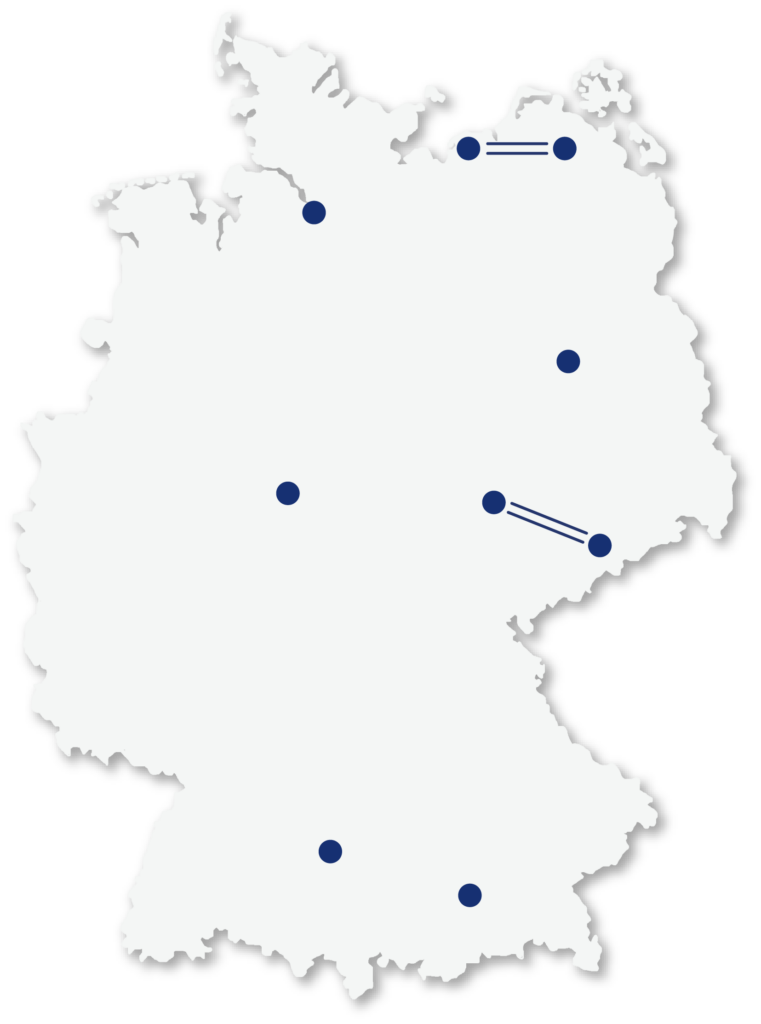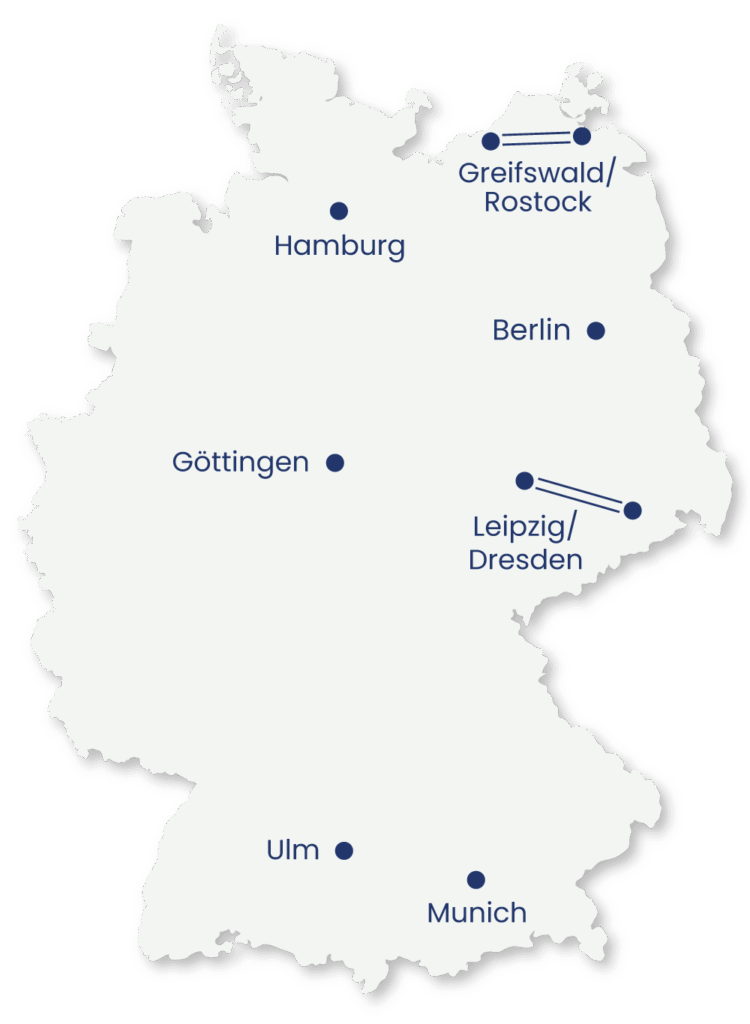Partner Sites
Organization and committees of the DZKJ
Partner Sites
Organization and committees of the DZKJ
Partner sites
DZKJ partner sites
As a research network, the German Center for Child and Adolescent Health combines the specialist expertise of university hospitals and universities at seven partner sites: Berlin, Göttingen, Greifswald/Rostock, Hamburg, Leipzig/Dresden, Munich and Ulm. Experts from various fields of research work together here on a cross-thematic basis. In addition to the university hospitals and universities, non-university research institutions such as Max Planck Institutes, Fraunhofer Institutes, Helmholtz and Leibniz Centres are also involved. The two-year start-up phase is being funded by the Federal Ministry of Education and Research (BMBF) with a total of 30 million euros. This will be followed by long-term institutional funding. By fostering strong networks and expanding existing research structures, the DZKJ establishes ideal conditions for interdisciplinary research excellence and the swift application of findings in practice, aiming to promote the long-term healthy development of children and adolescents. In the two-year start-up phase, the focus is particularly on the development of new diagnostic and therapeutic procedures as well as on prevention, taking into account the different developmental stages of adolescents.
The map will take you to the subpages of the seven DZKJ partner sites.

GREIFSWALD / ROSTOCK
The Greifswald/Rostock site has
special expertise in community
medicine, psychosocial
and mental health, as well as
expertise in telemedicine and eHealth.
HAMBURG
The focus of the DZKJ site in
Hamburg is on research into
of rare genetic diseases.
BERLIN
The Berlin site has particular
special expertise in rare genetic and chronic
and chronic inflammatory diseases,
and the investigation of early determinants
for a healthy development
and the development of diseases.
GÖTTINGEN
The Göttingen site has particular
special expertise in the
neurosciences.
LEIPZIG / DRESDEN
The Leipzig/Dresden site stands for
for expertise in the fields of
Epidemiology, environmental research, immunology,
infectious diseases, obesity and mental health.
mental health.
ULM
The Ulm site focuses on
Metabolism, hormones and obesity,
normal and impaired development of the
immune system, as well as mental disorders
and their immunometabolic basis.
MUNICH
The Munich site contributes its
expertise in immunology and metabolism,
computer sciences and cell and gene
and gene therapy.
Partner sites
DZKJ partner sites
As a research network, the German Center for Child and Adolescent Health combines the specialist expertise of university hospitals and universities at seven partner sites: Berlin, Göttingen, Greifswald/Rostock, Hamburg, Leipzig/Dresden, Munich and Ulm. Experts from various fields of research work together here on a cross-thematic basis. In addition to the university hospitals and universities, non-university research institutions such as Max Planck Institutes, Fraunhofer Institutes, Helmholtz and Leibniz Centres are also involved. The two-year start-up phase is being funded by the Federal Ministry of Education and Research (BMBF) with a total of 30 million euros. This will be followed by long-term institutional funding. By fostering strong networks and expanding existing research structures, the DZKJ establishes ideal conditions for interdisciplinary research excellence and the swift application of findings in practice, aiming to promote the long-term healthy development of children and adolescents. In the two-year start-up phase, the focus is particularly on the development of new diagnostic and therapeutic procedures as well as on prevention, taking into account the different developmental stages of adolescents.
The map will take you to the subpages of the seven DZKJ partner sites.

Rostock
GREIFSWALD / ROSTOCK
The Greifswald/Rostock site has
special expertise in community
medicine, psychosocial
and mental health, as well as
expertise in telemedicine and eHealth.
HAMBURG
The focus of the DZKJ site in
Hamburg is on research into
of rare genetic diseases.
BERLIN
The Berlin site has particular
special expertise in rare genetic and chronic
and chronic inflammatory diseases,
and the investigation of early determinants
for a healthy development
and the development of diseases.
GÖTTINGEN
The Göttingen site has particular
special expertise in the
neurosciences.
Dresden
LEIPZIG / DRESDEN
The Leipzig/Dresden site stands for
for expertise in the fields of
Epidemiology, environmental research, immunology,
infectious diseases, obesity and mental health.
mental health.
ULM
The Ulm site focuses on
Metabolism, hormones and obesity,
normal and impaired development of the
immune system, as well as mental disorders
and their immunometabolic basis.
MUNICH
The Munich site contributes its
expertise in immunology and metabolism,
computer sciences and cell and gene
and gene therapy.
